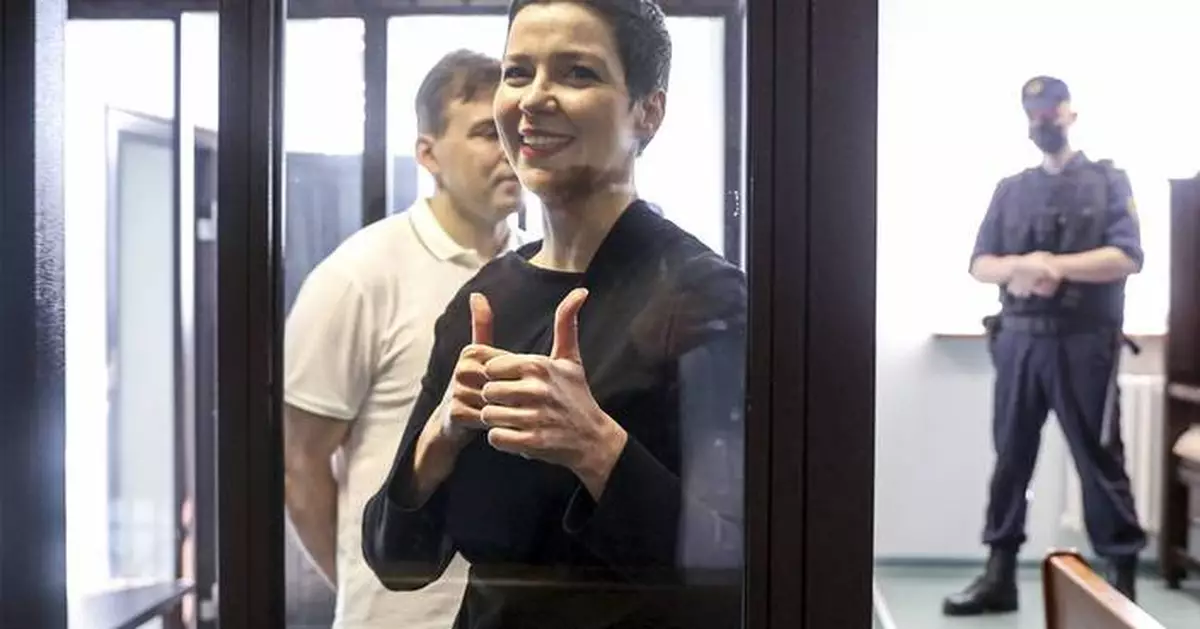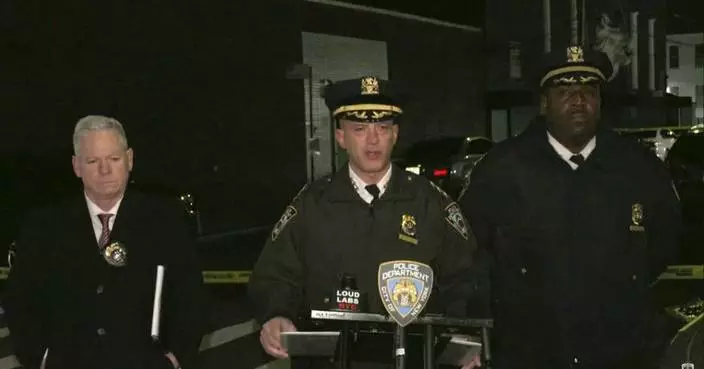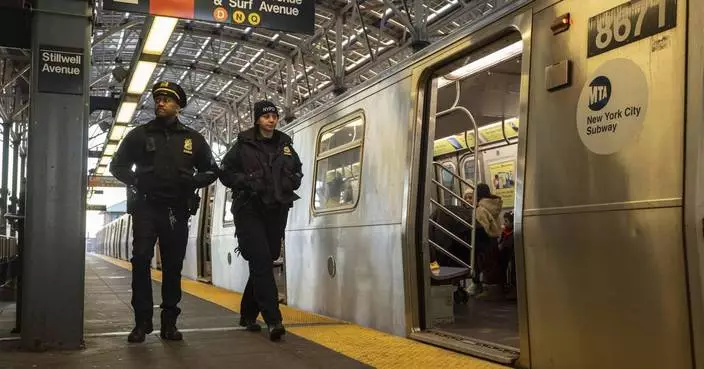TALLINN, Estonia (AP) — Imprisoned Belarusian opposition activist Maria Kolesnikova has resurfaced after more than 20 months without any communication with relatives or friends and met with her father, a human rights group said Tuesday.
Kolesnikova, one of the most popular and charismatic figures who helped lead protests of Belarus’ authoritarian President Alexander Lukashenko, was last heard from in February 2023.
The 42-year-old musician-turned activist, who suffered a serious illness and underwent surgery while in prison, has been serving her 11-year sentence at a facility near Gomel.
Viasna, Belarus’ leading rights group, said Kolesnikova met her father, Alexander Kolesnikov, at a prison hospital.
Raman Pratasevich, a former opposition journalist who later became a government supporter after he was arrested, on Tuesday released photos of smiling Kolesnikova embracing her father, who previously had been denied permission to see her. He said the meeting took place Tuesday, but it was not immediately possible to verify the photos or when they might have been taken.
Kolesnikova gained prominence when mass protests erupted in Belarus after the widely disputed August 2020 election gave Lukashenko a sixth term in office. With her close-cropped hair, broad smile and trademark gesture of forming her outstretched hands into the shape of a heart, she often was seen at the front of the demonstrations.
She became an even greater symbol of resistance the next month when Belarusian authorities tried to deport her. Driven to the Ukrainian border, she briefly broke away from security forces in the neutral zone at the frontier and tore up her passport, then walked back into Belarus. She was convicted a year later of charges including conspiracy to seize power.
In November 2022, Kolesnikova was moved to an intensive care ward to undergo surgery for a perforated ulcer. Former inmates told her sister, Tatiana Khomich, that the 5-foot-9-inch Kolesnikova weighed only about 45 kilograms (100 pounds).
Kolesnikova, who before the 2020 protests was a classical flautist, is one of several major Lukashenko opponents to disappear behind bars.
Viasna counts about 1,300 political prisoners in Belarus, including the group’s Nobel Peace Prize-winning founder, Ales Bialiatsky. At least seven have died behind bars.
The U.N. Human Rights Committee has repeatedly demanded Belarusian authorities take “urgent protective measures” in relation to Kolesnikova and other political prisoners held incommunicado. In September, the European Parliament demanded that Belarus release all political prisoners.
Lukashenko, who is seeking a seventh term in an election set for January 2025, has released 146 political prisoners since July. Those freed had health problems, wrote petitions for pardons and repented. At the same time, Belarusian authorities have launched a new wave of arrests, seeking to uproot any sign of dissent before the election.
Sviatlana Tsikhanouskaya, the Belarusian opposition-leader-in-exile, told The Associated Press that she was happy that Kolesnikova was allowed to see her father and reaffirmed a demand that she and other political prisoners be released.
“We must to keep pressing for an end to the isolation of other political prisoners and their release,” said Tsikhanouskaya, whose husband, Siarhei Tsikhanouski, is serving a 19 1/2-year prison sentence and has been held incommunicado for more than 20 months.
Pavel Sapelka of Viasna said allowing Kolesnikova to see her father could be a signal from Lukashenko that he's “ready to start a conversation about the fate of other political prisoners.”
“Lukashenko is waiting for Western reaction to the latest steps and is prepared to bargain ahead of January's election,” Sapelka said.
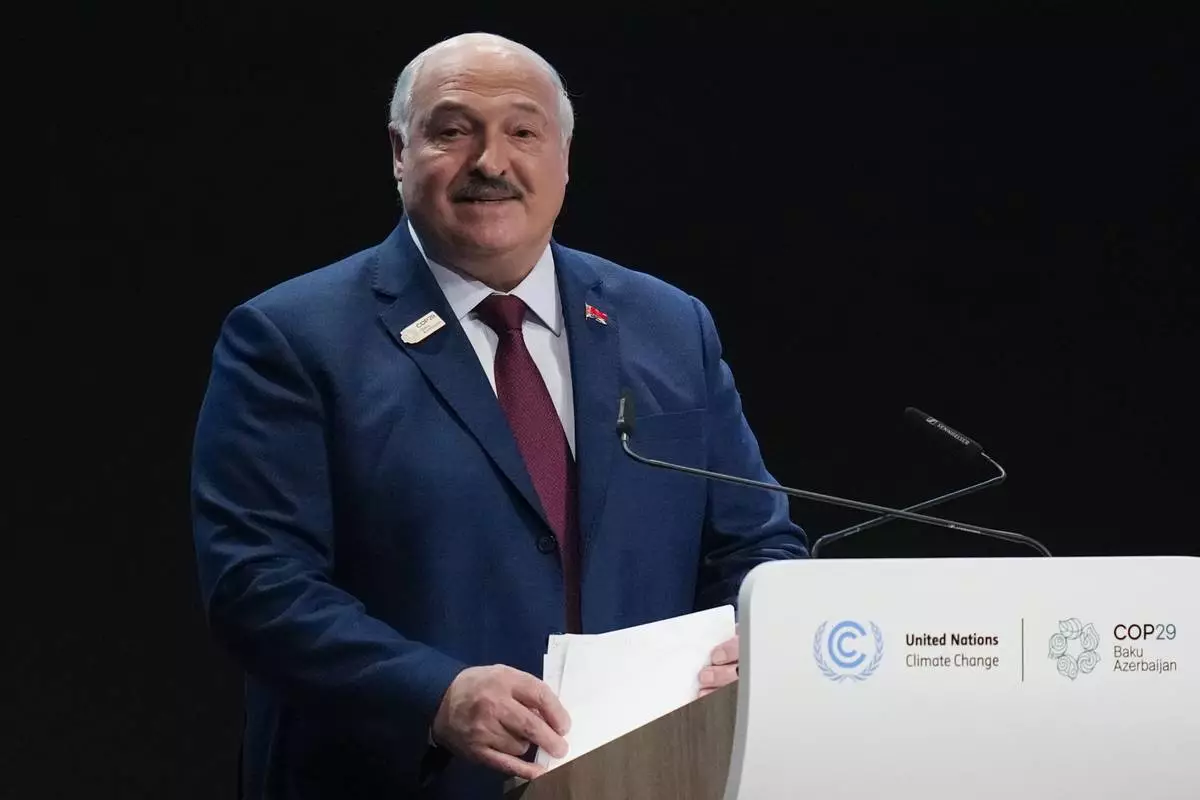
Belarus President Aleksandr Lukashenko speaks during a plenary session at the COP29 U.N. Climate Summit, Tuesday, Nov. 12, 2024, in Baku, Azerbaijan. (AP Photo/Rafiq Maqbool)
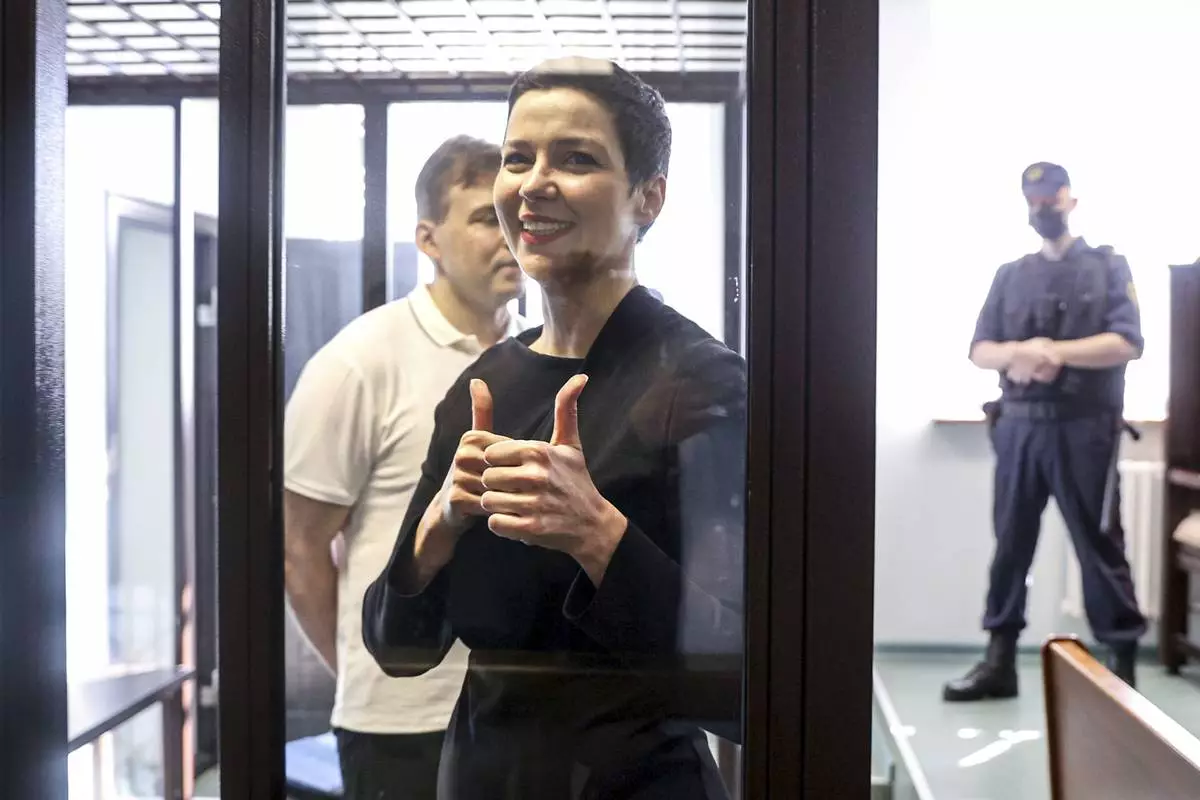
FILE - In this picture taken on Aug. 4, 2021, Belarus' opposition activists Maria Kolesnikova attends a court hearing in Minsk, Belarus. (Ramil Nasibulin/BelTA pool photo via AP, File)
SAN JUAN, Puerto Rico (AP) — Jenniffer González Colón was sworn in Thursday as Puerto Rico’s new governor during a normally ebullient ceremony held amid widespread anger over a blackout that hit the U.S. territory days ago.
González, a Republican who backs President-elect Donald Trump and whose pro-statehood New Progressive Party secured a historic third consecutive term after she won the Nov. 5 election, has pledged to stabilize the Caribbean island’s crumbling power grid.
“There are many challenges facing our island,” she said in her first public address as governor as she acknowledged the blackout in a speech to a crowd gathered in front of the seaside Capitol. “That is precisely what moves me to address that first challenge with a sense of urgency.”
She pledged to improve Puerto Rico's infrastructure, hospitals and schools, adding that she intends to boost bilingual education.
“I'm going to fulfill my promises to you,” she said. “I am not going to govern only for those who voted for me. I am going to be the governor of all Puerto Ricans.”
Before the start of a ceremony to celebrate her swearing in, González attended Mass surrounded by family and supporters.
“What better than to come first to thank God and to ask God to give me the wisdom, the fortitude and the tools to fulfill everything I promised the people of Puerto Rico,” she told reporters.
A protester with her face covered interrupted the Mass at Parroquia Santa Teresita in San Juan. She yelled, “Jenniffer, we came for you! Puerto is without power.”
Meanwhile, a small group of protesters gathered at the Capitol before González’s arrival. They were especially rankled that a well-known, outspoken activist elected to Puerto Rico's Senate for the first time was not allowed inside the Capitol, with the elections commission noting he had not yet been officially certified.
Protesting the ceremony was Yara Humarán Martínez, an aquatic physical therapist whose 83-year-old mother remains without power.
“I don’t have any hope that she will change anything,” she said of the new governor.
González has promised to appoint an energy “czar” to review potential contractual breaches while another operator is found to possibly replace Luma Energy, a private company that oversees the transmission and distribution of power in Puerto Rico.
However, no contract can be canceled without prior approval from Puerto Rico’s Energy Bureau and a federal control board that oversees the island’s finances.
Outages were still being reported on Thursday as crews tried to stabilize the grid following the blackout that hit early Tuesday, leaving 1.3 million customers in the dark as Puerto Ricans prepared for New Year’s Eve.
While electricity had been restored to 99% of the utility's 1.47 million total customers, more than 600,000 were temporarily left without power on New Year’s Day when part of the system collapsed again, according to Luma.
“The stability of the system is fragile,” Luma said late Wednesday as it warned of more outages on Thursday given an ongoing lack of generation. “We know and understand how frustrating it is for our clients to be without service for long periods of time.”
Backup generators were put in place to ensure a smooth swearing-in ceremony on Thursday given that renowned musicians were scheduled to perform.
The anticipated revelry was characteristic of González, a 48-year-old attorney and recent mother of twins who prior to the election showed up at her party’s assembly wearing a Wonder Woman tiara and cuffs. She also made the news after peeling out of one of her party’s conventions in an off-road vehicle earlier this year.
Supporters and critics gathered for the ceremony, some clutching umbrellas to shield themselves from the blistering sun.
“Because she’s a woman, she’s going to be a great governor,” said Amanda Sánchez León, a retired government employee, who arrived two hours early to secure a spot outside an area reserved for guests. She said she was hopeful that González would reduce violent crimes and improve education and health, “especially for us older people.” She also believed the power crisis would improve and that González would see her promises through.
“The people are suffering,” Sánchez said.
Also supporting the new governor was Lizbeth Rodríguez, a school nurse, who believed that as a mother, González would prioritize the island’s weak education system and tackle crime.
But Rodríguez remains rankled at what she believes is the misspending of government money.
“That’s what bothers the people. You’re doing fine, sure, but look at us,” she said.
González, of the pro-statehood New Progressive Party, had beat former Gov. Pedro Pierluisi during their party’s primary in June.
At the time, she was Puerto Rico’s representative in Congress and had run on Pierluisi’s ticket four years ago.
After beating him, she won the Nov. 5 general election with more than 526,000 votes, or 41%. Trailing her was Juan Dalmau, who represented Puerto Rico’s Independence Party and the Citizen Victory Movement.
It was the first time that the Popular Democratic Party, which supports the island’s territorial status quo and is one of Puerto Rico’s two main parties, came in third in a gubernatorial race.
While González’s immediate challenge is Puerto Rico’s fragile power grid, she also inherits a feeble economy that has slowly been strengthening since the U.S. territory’s government declared in 2015 that it was unable to pay its more than $70 billion public debt load.
In 2017, it filed for the biggest U.S. municipal bankruptcy in history.
All but one government agency has since restructured its debt, with Puerto Rico’s Electric Power Authority still struggling to do so. It holds more than $9 billion in debt, the largest of any government agency.
Experts warn the island will keep struggling to attract investors until the debt is restructured and the power grid strengthened.
González also will have to work alongside a federal control board that U.S. Congress created in 2016 to oversee Puerto Rico’s finances and supervise the ongoing reconstruction after Hurricane María slammed into the island in September 2017 as a powerful Category 4 storm, razing the electrical grid.
She also faces pressure to create affordable housing, lower power bills and the general cost of living, reduce violent crime, boost Puerto Rico’s economy, with the island locked out of capital markets since 2015, and improve a limping health care system as thousands of doctors flock to the U.S. mainland.
Like other governors of the pro-statehood party, González has said she would push for Puerto Rico to become the 51st state, but such a change would require approval from U.S. Congress and the U.S. president.
A nonbinding referendum held during the Nov. 5 election, the seventh of its kind, asked voters to choose one of three options: statehood, independence and independence with free association, under which issues like foreign affairs, U.S. citizenship and use of the U.S. dollar would be negotiated.
With 63% of voters participating, statehood earned more than 615,000 votes, or 59%, with independence coming in second for the first time with more than 309,000 votes, or 29%. Independence with free association garnered more than 128,000 votes, or 12%.
While Puerto Ricans are U.S. citizens, they are not allowed to vote in presidential elections, and officials with the New Progressive Party have noted the island receives unequal treatment when it comes to Medicaid, Medicare and other federal programs.
“Statehood means equality, and I want us to have that access to opportunities,” González said. “I want to have those opportunities here so that our people can move forward.”

A street is dark during a blackout in San Juan, Puerto Rico, after sunset on Tuesday, Dec. 31, 2024. (AP Photo/Alejandro Granadillo)




